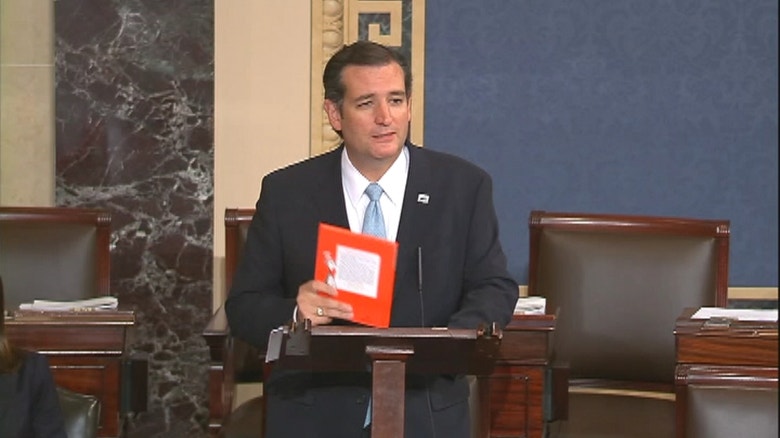
Donald Trump is still in the lead in the Republican race, and parts of the elite are placing their hopes on Ted Cruz. But the reactionary from Texas cannot cure the anger of the voters.
When the pollsters were studying Wisconsin, it always looked like a tough state for Donald Trump: more highly educated than the average, more traditional Republicans, and religion was slightly more important. Therefore, the convincing win of Texas Sen. Ted Cruz in Tuesday’s primary doesn’t necessarily mean a turning point. The unruly tycoon from New York is still in the driver’s seat.
In the Democratic presidential primaries, Bernie Sanders has now won seven of the last eight contests. This is also not a reason to jump to conclusions. Hillary Clinton’s lead in the number of states going into the convention this summer is almost unbeatable, despite yet another slip up on her part.
If nothing else, Wisconsin was another indication of Trump’s difficulties in assembling a majority of Republicans. The party establishment has for a long time hoped for a miracle to put an end to the nightmare. Anyone but the madcap is the rallying cry, and suddenly, Cruz appears to be the new face of hope.
However, the devil may not be better than the deep-blue sea. Although reactionary Cruz believes that the last presidential election shows how unwise it is to run a Republican pragmatic, the theory that an ultraconservative demagogue would manage to appeal to the masses is also highly doubtful. Barry Goldwater, positioned to the far right, lost miserably as far back as 1964.
Cruz is the most detested in Congress by colleagues, including in his own party, since he despises working as a team. He is proud to have contributed to the absurd 2013 government shutdown. Just like Trump, he wants to build a wall to keep out Latin American immigrants and to deport all the 11 million undocumented immigrants already in the country. He is competing with his rival in anti-Muslim propaganda. He wants to re-introduce the gold standard and abolish the Internal Revenue Service.
Just like Donald Trump, Ted Cruz would be a dangerous man in the White House. However, neither of them are likely to stand a chance against Hillary Clinton.
Never before has a presidential candidate evoked as much dislike as Trump. Even Cruz will soon be made aware that the average American is quite different from the activists in the primaries. The Republican Party is increasingly a party for older white men, and struggles to appeal to women and young people. The negative view on immigration is alienating minorities, and Hispanics are the fastest growing segment in the electorate.
The anger against anything remotely elitist has so far dominated the campaign. The real issues have disappeared in the crossfire of abuse. Cruz is winning the ideologically conservative, but Trump takes home the angriest of the Republicans. On the other side of the fence, 74-year-old Bernie Sanders has become the magnet for young, angry left-wing voters. Nobody is more establishment than Clinton.
The challenger Sanders proclaims that Wall Street is to blame for everything, and that the solution is to disband the large banks and make all benefits “free.” When questioned about how it would work practically, he has no answers. He doesn’t really want to admit that his political revolution would come with consequences demanding consideration. In that sense, he is not unlike Trump.
But if the anger of the electorate is real, what is causing it? On the left, they say it is the inequality in society, and that the increase in low-paid work is making the rich richer. There is something in this, but it’s not the full story.
It is true that the financial crisis left a big scar on Americans. Two-thirds of people view the U.S. as heading in the wrong direction. This is despite the economic recovery, which has been in progress for years, decent growth, and employment going up.
In a thoughtful article in The New York Times, political scientist Lynn Vavreck compares attitudes from recent decades. People today are about as happy with the economy as they were during the optimistic Reagan period in the 1980s. The difference in the satisfaction levels of income groups is less than during Bill Clinton’s 1990s.
The anger appears to be more about politics, especially among political opponents. The hostility between the members of the opposite parties and their respective solutions is growing. The frantic mood surrounding “Obamacare” is one example. Differing views on skin color, religion and ethnicity are often part of the picture.
Republicans have been moving to the right for a couple of decades, whereas Democrats have been moving to the left. This can also be seen in Congress, where the former overlap between the parties is now pretty much nonexistent. The polarization in Washington is crippling.
After an election like this, it is time for reflection. The Republicans’ bellowing against Washington and Obama has created Trump. The Democrats are hardly convincing either. Compromises must become a part of the future.

Leave a Reply
You must be logged in to post a comment.